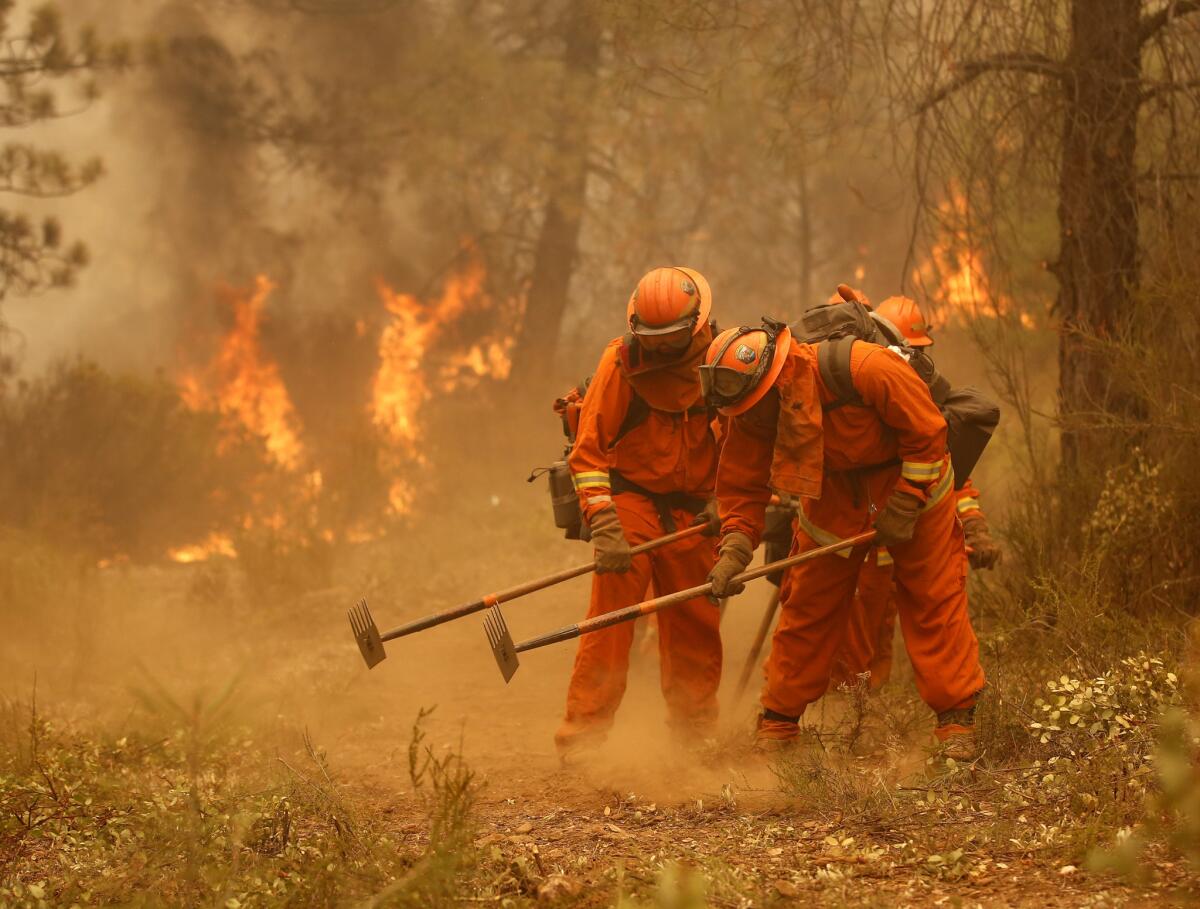Changing the story: California says convicts with violent felonies have always fought fires

Despite years of statements to the contrary, California corrections officials say inmates with violent felonies have always been eligible for fire duty.
- Share via
Reporting from Sacramento — After years of public statements to the contrary, California corrections officials now acknowledge that prisoners sent to fight wildfires or work on community projects include those convicted of violent felonies.
“The confusion over the firefighters is over the term ‘violence,’” Corrections Secretary Jeffrey Beard said in an interview Thursday.
He was referring to his department’s efforts this week to address the question of who works on ground crews that are a crucial part of the state’s response to wildland fires.
Corrections department websites and staff have consistently said those convicted of violent crimes were not eligible to join state firefighting camps.
“They must have no history of violent crimes, as defined by the California Penal Code,” the department’s website said as recently as Sept. 5. The reference to violent crimes has since been removed.
Beard said Thursday the longstanding statement was wrong. He said inmate firefighters are selected by their prison risk classification, a rating that determines their security level and which takes into account aspects of the original crime and an inmate’s behavior behind bars.
“In the system we look at violence differently. Not all violent offenses represent violent behavior by the individual,” Beard said.
He cited, for example, the difference between someone who commits a robbery with a threat, and someone who also injures the robbery victim.
Nearly half of the inmates currently assigned to fire camps have convictions of crimes the penal code classifies as violent, a department spokesman said.
“As of Sept. 30, it was 1,441 inmates out of a total of 3,732 in the fire camps,” Jeffrey Callison said Thursday morning. “It’s actually a mixture of serious and violent crimes, but principally violent crimes.”
Though inmates have walked away from the fire camps, there have been no incidents of violence involving those prisoners while on fire duty, Callison said.
Early in the week Callison had denied an Associated Press story that said the agency considered, then dropped, plans to allow felons with violent crime convictions on those crews.
But on Thursday, Beard said the department had considered expanding the list of crimes for which inmates may be considered for fire duty. Beard said that proposal had been dropped.
SIGN UP for the free Essential Politics newsletter >>
Inmates make up a third of California’s state firefighting force, cutting brush, digging fire lines and doing other such physical work.The rest of the year they are loaned out to local communities and private agencies for projects that range from fence repair and brush clearing to park maintenance.
As the state prison population has been reduced, with lower-level felons now sent to jails, so has the number of inmates available to staff firefighting crews.
California forestry officials said they were forced this season to reduce the number of inmates on each fire crew to as low as 14, down from the typical 17. In response, Beard said the department is considering allowing inmates to transfer to fire duty with as many as seven years remaining on their prison sentences. The current limit is five years.
For more California corrections news, follow me at @paigestjohn on Twitter
For the latest on political coverage, go to www.latimes.com/politics.
ALSO:
Jerry Brown OKs automatic voter registration through DMV
California schools barred from using ‘Redskins’ as team name or mascot
‘Right-to-try’ bill to help terminally ill access experimental drugs falls flat
More to Read
Sign up for Essential California
The most important California stories and recommendations in your inbox every morning.
You may occasionally receive promotional content from the Los Angeles Times.














